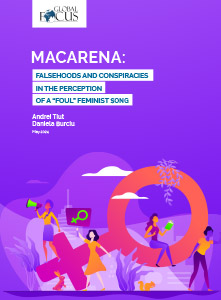Summary
In February 2024, the lyrics and video for the song “Macarena” by trap artist Erika Isac caused an amount of uproar in public debate. A feminist manifesto with a particular focus on sexual violence and the objectification of women, the clip did not shy away from foul language or implied nudity. It was followed by “Women in Parliament”, dealing with the issue of under-representation of women in politics and “Industry Plant”, addressing some of the criticism directed against “Macarena”.
The initial song received praise but also criticism, particularly due to the perceived improper language and overgeneralisation. Some of this criticism can be part of a healthy, legitimate debate, but GlobalFocus has also identified a series of narratives that are manifestly false and fit into larger misogynistic or conspiratorial trends. These include:
The song is directed against all men. This narrative was pushed almost exclusively by men and it seemed impervious to counter-arguments or denials from the author.
Art and culture are not a place to use foul language. This narrative is particularly weird as several Romanian classical authors have used such language, as have many more in the world literature. At least one critic seemed aware of this problem and proposed that political contestation art should use tamer language.
More marginal but also more creative, a series of conspiracy theory proponents claimed or suggested that the true aim of the song and its publicization is to manipulate to distract from the important issues such as going to vote in the upcoming elections or the conflict in Gaza (!).
Other narratives were too vague or philosophical for us to be able to describe them as misleading. Particularly, we noted that several actors said that art should not bring a profit.
Notwithstanding personal intentions, these narratives contribute to two overarching purposes.
Gatekeeping. Protests (particularly in this case feminist protests) were required by these narratives to be civilised, proper, not too antagonistic, not-for-profit, and to make sure not to step on the toes of people (men) who might over-interpret. The actors who promoted these narratives tended to be cultural and/or (social) media celebrities, some of them having had a history of edginess and provocation themselves. They avoided asking for any form of formal censorship voicing their “personal” unhappiness; however, when they described the clip and prescribed behaviour their wording was firm and condemning. They were not voicing frustration, they were pontificating.
Building blocks for conspiracies. While mainstream voices that attacked the song seemed focused and passionate, conspirationist and far-right voices gave less attention to the subject. Some of them, however, used the scandal as another example in their conspiracy of the day.
Leading political figures tried to benefit from “Macarena” and the widespread public attention surrounding it by incorporating elements from the song into their messaging against opponents.
This
report has been completed with support from Open Information Partnership (OIP).
The opinions expressed are solely those of the authors and do not reflect those
of OIP.
Context
On February 14, 2024, Romanian singer Erika Isac released the trap protest-song “Macarena”, along with its accompanying music video[i]. The song became highly controversial.
The song combines modern music, implied nudity, and strong language to address rape culture and challenge traditional gender roles, and personalises Romanian men discriminating women, by assigning them a shared identity – “Mirel from Turnu Măgurele”[1] – highlighting the widespread facet of this attitude.
It was launched against the background of persistent gender inequality in Romania. According to a 2023 World Bank Group report, Romania continues to exhibit performance issues in terms of gender equality across different socioeconomic dimensions, including health, the labour market and political representation, as well as gender norms – more than eight out of ten Romanians believe that women’s primary role is to care for the home and family[ii]. One in four Romanian women have been abused physically or sexually by their partner or former partner, and over 55% of Romanians consider that “rape is justified in certain circumstances”[iii].
Reception. Shortly after its release, the video became the number one trending video on YouTube Romania[iv], and turned into a subject of intense public debate in social and traditional media.

Google Trends: interest in “Macarena” peaked
on February 20th, a week into its release.[v]
A survey by Leo Burnett and Data Intelligence showed that 35% of respondents appreciated the message of “Macarena”, but disliked “either the vulgar language, the music video or the song’s genre”. It also showed that one in three men consider the song to be a “demonstration of women’s victimisation”, and that “the message was not relevant for the Romanian society”[vi].
Main narratives of misinformation
What we analyse
The purpose of this paper is to discuss the narratives built around the “Macarena” song and its music video, inasmuch as they are based in manifest falsehoods. This puts us in the unenviable position to decide what is “true” when speaking about an artistic act. While this requires caution, our analysis has identified manifestly false narratives in the critical reactions to “Macarena” that have a toxic influence on the public debate and promote a distorted perception of the music video and its feminist message.
As such, we excluded narratives that are not manifest falsehoods, but rather analytic or philosophical differences – even when we largely disagreed with them.
For example, the video has been occasionally described as classist (Turnu Măgurele being a relatively economically underdeveloped municipality). We have also encountered a naive narrative claiming that “Macarena” does not qualify as art because it is a profit-motivated act[vii][viii][2].
Narrative 1
A first false narrative claims that the video is directed against all men – Isac’s lyrics were inaccurately portrayed as a generalising, disparaging message, and fitted into the “man-hating” narrative that is often used to discredit the feminist movement[ix].This perception has led to reactions that “not all men” are responsible for the behaviour described in the song. The claim is partly based on the lyrics:
Mirel from Turnu Măgurele/ came to educate us: / “Hey, you got issues”
The specific claim was that “Mirel” (a relatively uncommon Romanian name) is a stand-in for “all [Romanian] men”. This is obviously a wrong reading. “Mirel” is seen as a part of a greater whole, as denoted through the use of a singular example and through the localisation (Turnu Măgurele is a one of several parts of Romania just as “Mirel” is one of several typologies of Romanian men).
In the song, Isac also implies that no men would be required to protect women [from men] … if no men existed in the first place. This was also interpreted as a critique of all men, even though “Only/ mostly men are aggressive towards women” is definitely not the logical equivalent of “All/most men are aggressive to women”.
It’s worth noting that many of the (typically male) promoters of this narrative, as public figures, have not been particularly known as illiberal or misogynistic. They are also, oftentimes, public intellectuals or people otherwise capable of distinguishing between universal and particular affirmations. They were oftentimes warned in the comment sections of their posts or articles that the song is not directed against all men. The singer herself clarified that the song is solely against those that engage in the kind of behaviours she illustrated in her lyrics and video, claiming that the core message is lost on men that “don’t see an issue in their abusive behaviour”[x]. Yet, these figures persisted through repeated social media posts and sometimes editorials, growing more radical as they were met with more criticism.
Poet and publicist Florin Iaru feigned disinterest in the video that purportedly showed “what women think of men” because “people are equal, regardless of gender, nationality, race or sexuality” (the implication here is that Erika’s clip is built on different ideas)[xi]. In another post he claimed that the video implied “all men are alike”[xii]. Later on, defending his friend, journalist Viorel Ilișoi, who had been extremely critical of the song, he characterised the backlash as follows: “suddenly, the world discovered that the Man had tarnished the noble ideals of feminism”[xiii].
Marian Godină, a law enforcement officer and social media celebrity, also said that the lyrics are not relevant to “all women or all men”, but rather those who are “careless, meet people on Tinder and go out together without knowing each other”. A self-described “old-fashioned man”, he claimed that first dates should happen during daytime, in safer places like restaurants, coffee shops and bakeries, and that women should only accept to go on a date after completing a thorough investigation of the individual inviting them[xiv]. The post was in turn criticized as an example of victim blaming and, later on, he apologised to “anyone he may have hurt”, without fully retracting his statements[xv].
Narrative 2
A second narrative states that art cannot contain foul language.
This one is more straightforward to debunk. The history of art includes uses of foul and scandalous language. To use a local example, Ion Creangă, a member of the “great classics” of the Romanian literary canon and author of a series of mandatory readings for young pupils, wrote “The story of the dick[3]”, a story centred on multiple instances of the graphic subject mentioned in the title.
TV personality and former politician Robert Turcescu invoked a somewhat sensitive subject to Romanians – the current state of national education – in order to ridicule the message of “Macarena”. Turcescu’s non sequitur contained a false connection between the weak performance of the country’s educational system and the foul language used by Isac in the song:
So well and beautifully has education been spoken of […] in the last three decades that today we reap the fruits of this rhetoric in the form of a succinctly articulated dividend, loudly proclaimed by one of the leading representatives of the new generation, Miss Erika Isac: ‘Go f**k yourselves!’[xvi]
Marius Manole and Oana Pellea, well known and respected actors, brought in a more elusive critique. Both claimed they will not willingly see the clip, because of the profanities that were quoted in social and online media. Profanities seem to be disqualifying for the two ab initio – both have surely said or heard profanities in their long career. While Manole did not address this contradiction in any way, in Oana Pellea’s view the tabu on profanities seems to apply due to the political/militant character of the piece:
Does anyone believe that force can be fought with force, vulgarity with vulgarity, underculture with underculture? On the contrary!
The actress continued by saying
that this is her “choice”, a strategy she had used in the past in order to
minimise backlash against controversial opinions.
Narrative 3
The release of “Macarena” was also subject to various conspiracy theories.
Members of the far-right outlet Gold FM, owned by far right AUR party associate and former MP Cozmin Gușă, and known for promoting a long series of conspiracy theories and pro-Kremlin propaganda, called Isac “an instrument of political propaganda that promotes the hypermasculinisation of women” and even drew a parallel with Taylor Swift “who was recruited and used by Soros to support presidents”. Moreover, it was claimed that Isac and Swift are both “targeting a particular social category in order to activate and [manipulate] it, more or less subliminally, to vote in a certain direction”.
Monica Tatoiu, entrepreneur, socialite and sometimes politician claimed that the song is “distracting the youth from thinking about who to vote for”:
Instead of thinking about who they vote for so they don’t starve [like?] cockroaches, they look at singers and stories like that[xvii].
Similar positions were taken by Aurelian[xviii], a radical populist blogger turned politician.
Aftermath and political instrumentalistion.
“Mirel from Turnu Măgurele” – a new label for political mudslinging
Once the song entered the wider public discourse, gaining traction on social networks and mainstream media coverage, leading political figures integrated references from “Macarena” into their messaging. Prime Minister and PSD party leader Marcel Ciolacu compared his right-wing political opponents to the character of “Mirel from Turnu Măgurele”:
This is their style [Mirel’s] – they are good at everything, they know everything, but they don’t have any solution. […] I listened to the song [and] I discovered Mirel. They are all Mirels.
One of the targets of Ciolacu’s jibes, USR party leader Cătălin Drulă, directed similar “Mirel”-centred criticism against PSD leader, calling him “Marcel from Buzău[4]”[xix].
“Women in Parliament” – she had a political agenda all along
On the backdrop of the attention generated by “Macarena”, on International Women’s Day, March 8, Erika Isac released another song, titled “Women in Parliament”[xx]. While continuing on the feminist theme of her previous release, “Women in Parliament” focused more on the participation of women in politics and loosely addressed some of the negative reactions to “Macarena”, once again referencing the character of “Mirel”.
Some female politicians associated themselves with the song and used it to promote their work on TikTok – PSD MP Laura Vicol posted a video[xxi] of herself working inside the halls of the Parliament, with Isac’s song playing in the background, drawing over 500.000 views; a similar post[xxii] was made by MEP adviser Tana Foarfă, who included footage of herself in the Romanian and the European Parliament buildings, gathering around 85.000 views.

[1] A municipality in Romania.
[2] On April 26, Isac released “Industry Plant”, a song addressing – as the title suggests – the various reactions questioning the real intent behind “Macarena”, Isac’s feminism and allegations of it being a PR/marketing scheme orchestrated by Isac’s record label in order to capitalise on public attention and division – https://www.youtube.com/watch?v=zIAf1Gb1eIw.
[3] https://www.ziuaveche.ro/images/pdf/12/Povestea%20pulei.pdf
[4] A reference
to Ciolacu’s hometown.
[i] https://www.youtube.com/watch?v=C0Bc0nwSerM
[ii] https://www.worldbank.org/en/country/romania/publication/gender-equality-in-romania-where-do-we-stand-2023-romania-gender-assessment
[iii] https://centrulfilia.ro/date-despre-drepturile-femeilor/
[iv] https://www.paginademedia.ro/stiri-media/erika-isac-macarena-interviu-21498856
[v] https://trends.google.com/trends/explore?date=2024-02-12%202024-03-30&geo=RO&q=%2Fg%2F11vqhgvzsm
[vi] https://dataintelligence.ro/erika-isacs-song-macarena-perception-of-romanians-in-numbers/. The study employs an unspecified methodology to obtain a national representative sample through online interviews. Due to the lack of transparency some caution is advised.
[vii] https://bookhub.ro/de-ce-macarena-erikai-isac-nu-intra-sub-umbrela-artei/
[viii] https://gandeste.org/analize-si-opinii/alexandru-racu-concertul-ratatilor/130970/
[ix] https://academic.oup.com/book/1722/chapter-abstract/141334818?redirectedFrom=fulltext
[x] https://pressone.ro/interviu-erika-isac-barbatii-cu-adevarat-ok-inteleg-despre-ce-e-vorba/
[xi] https://www.facebook.com/iaru.florin/posts/pfbid06ym1wopPw5AXsanHqyDVe3pudG1gPQbEHxDN5V8bdbwFrSELMEBkyeSHgPVKqJCVl
[xii] https://www.facebook.com/iaru.florin/posts/pfbid02wxkUknbP75BJDL4v4dQh9KWtk24gmFDFcTNK5gsfa8WPbqwNTYewF4UXfu9v47qzl
[xiii] https://www.catavencii.ro/un-manifest-si-o-basina-intra-intr-un-bar/
[xiv] https://www.facebook.com/100044315535349/posts/995962091890966
[xv] https://adevarul.ro/stiri-interne/societate/marian-godina-criticat-dur-dupa-ce-a-comentat-2341321.html
[xvi] https://ecopolitic.ro/robert-turcescu-avem-rezultatul-romaniei-educate-de-politicieni-timp-de-30-de-ani-ne-o-spune-chiar-o-adolescenta-dra-erika-isac-da-va-n-p-mea/
[xvii] https://www.viva.ro/vedete-si-evenimente/monica-tatoiu-reactie-acida-erika-isac-piesa-macarena-3357205
[xviii] https://t.me/wwwAurelianRO/18932
[xix] https://spotmedia.ro/stiri/politica/marcel-ciolacu-am-ascultat-macarena-il-descopar-pe-mirel-din-turnu-magurele-toti-sunt-mirei-forta-de-dreapta-reunita
[xx] https://www.youtube.com/watch?v=FoQS41g6VrA
[xxi] https://www.tiktok.com/@laura_vicol/video/7344411048969063713
[xxii] https://www.tiktok.com/@tanaalexandrafoar/video/7343869730475805984
[xxiii] https://www.educatieprivata.ro/macarena-in-cuvinte-si-imagini/
[xxiv] https://www.protv.ro/articol/97923-exclusiv-erika-isaac-tanara-care-a-facut-furori-cu-piesa-macarena-interviu-pentru-pro-tv-am-scris-piesa-pentru-cine-are-nevoie-de-ea-nu-pentru-toata-lumea




